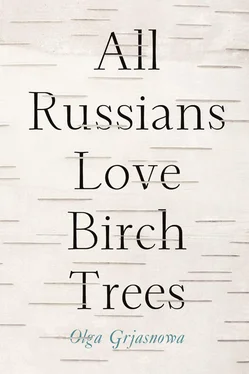My mother kept calling and asking whether I wanted her to visit, and I kept saying no. She came on Sunday and brought the leftovers of my father’s birthday dinner. I put two plates out, as well as forks and knives. I left the food itself in the Tupperware containers, not bothering to reheat it. Mother gave me a concerned look and I stared back wearily. She wanted to know everything about Elisha’s diagnosis. My parents had long agonized over how to Russify Elias’s name, to impose both their love and an affectionate diminutive on him. When my father finally exclaimed “Elisha,” my mother applauded in delight — Elisha it was.
We ate in silence. I didn’t mind it, but my mother couldn’t bear the quiet and started talking about her job. She was a piano teacher — first at a music school, then at an academy. She, too, initially struggled with the new system: trained at a Soviet conservatory, she had professional standards which she couldn’t just leave behind. When the father of one of her students, a priest, complained to her that his daughter didn’t have fun in class, my mother’s heart started racing and her hands grew sweaty. Thus far she had not been aware that the purpose of art was fun . And she would’ve least expected to hear it from a priest. Music had been taken very seriously in the USSR, as were ballet and the visual arts. Unlike in Germany, every child had the opportunity to get not only a school education, but also a highly professional and — on top of that — free artistic education, as long as the child was willing to work hard. And it was completely unfathomable to my mother how somebody could not want that.
Back in the day, when she was still young, gorgeous, and successful, and before she married my father on a whim, our living room had held a grand piano. Preparing for a performance, my mother would practice for days on end. Because of hygienic concerns and the General Situation, I’d only gone to kindergarten for a few weeks. Instead, I’d stayed in the living room, sitting under the grand piano and listening to my mother play. Whenever I saw my parents now, I always assured them that I was fine. I talked about my stipends, summer academies, internships, and stays abroad. I told them about my plans; where I would work and how much I would earn. I told them about Sami and then about Elias, and my parents believed every single word because I played my role well. When we got around to the meat dish, lamb with steamed chestnuts, dried fruit, and dolma (those grape leaves stuffed with rice, ground lamb, finely minced onions, and nuts), my mother laughed. I told her hospital anecdotes that I made up as I went along.
She finally left, leaving behind pomegranates, oranges, pears, bananas, stuffed puff pastry, and the last piece of chocolate cake. I turned on the TV. A rerun episode of Tatort flickered across the screen. All signs pointed toward the detective spending a hot night with a Southern European. I cranked up the volume and went off to take a shower. I thoroughly scrubbed away dead skin cells and the faint smell of hospital. I tried to recall Elias’s body without the screws and the long scar on his thigh. Then I imagined kissing a woman in the staircase, in the midst of banging doors, cooking smells, and screaming children, and how I would slip my hands between her thighs. I was back on the couch, putting cream on my legs, before the murderer was caught. I had a suspicion and awaited the solution.

The digital display on the clock radio showed four a.m. My stomach cramped, I had a bad taste in my mouth, my neck ached. Grudgingly I schlepped myself to the bathroom and looked for the tampon box. Under the warm stream of the shower I washed off the blood, then wrapped myself in a mint green towel and went back to bed.
It was quiet in the apartment. I wondered whether I had locked the front door, whether it was normal that the fridge made such dubious noises and why the neighbors were already awake, stomping down the stairs. At five a.m. I decided that staying in bed was pointless. I picked up the first piece of clothing I found, a red-and-white-checkered summer dress that barely covered my hips so that I looked like a child that had grown too quickly. I tied my hair back and went into the kitchen. I tried to imagine all the things I could do now that Elias wasn’t there, but couldn’t come up with any. And therefore I also stopped doing the things I used to do in his presence: every surface was cluttered with open packaging, newspapers, used mugs, bowls; the trash was overflowing and of course I’d not bothered to separate out paper, plastic, compost, metal, electronic appliances, and bulky items. I turned on the radio and translated the morning news into French while I rinsed out the stovetop espresso maker and soaked a crescent roll in a bowl of milk. The phone’s ringing startled me and I choked on the roll, which I hadn’t bothered to bake prior to consumption. The display showed Elisha’s number.
“Already awake?” I asked, surprised.
“What do you think? They wake us up at six a.m. for the ward round and stare at us like rabbits pulled out of a hat. And if somebody sleeps through the magic trick, they’ll come back.”
“How are you?”
The line crackled.
“Are you in pain?” I asked again.
“No,” he replied.
Both of us knew this was a lie.
“Do you think you could come earlier today?” he hesitantly asked.
“Yes.” I tried to sound tender, and just then recalled that I had a seminar today. But it was too late. I had already agreed to come.
“Thank you.”
“No problem. Should I bring you anything?”
“Warm clothes — I have to keep the windows open here.” He murmured something into the telephone that I didn’t understand and then continued in a normal volume: “A scarf and a pullover if possible, the black one and the light gray cashmere one.”
“Do you want anything to eat?”
“God no. I’m constantly being force-fed here. I’m starting to beef up. But you could bring me the books and the lens from the dresser, first drawer on the left. This time the right one, please.”
“You hardly need all your fucking equipment there, do you?”
I hung up and tried to fish the soggy piece of bread from the cereal bowl. It turned out to be easier to just drink everything. I was furious. With Elias, with myself, with the entire world.
I wandered through the art academy library that was so very different from the one in my department. Again and again I pulled a book from the shelves and leafed through reproductions of old Flemish masters and descriptions of happenings. Holding in my hands the catalog for the Sonic Youth exhibition, I asked myself whether my life had taken the right course. Languages come easily to me. I quickly grasp the patterns and have a good memory, but in the last few years I had hardly done anything other than learn technical terms and grammar constructions. I was disciplined and hungry for success. In school I had studied English, French, and a bit of Italian, then I had spent a year as an au pair in France to perfect my French. Afterward, I’d enrolled to study interpreting. In my free time I studied Italian, Spanish, and a bit of Polish, but I never managed to work up enthusiasm for the Slavic languages. Nonetheless, I spent a semester at the Lomonosov University in Moscow, then did internships with international organizations in Brussels, Vienna, and Warsaw. A scholarship had freed me from having to work on the side. But by then I had compiled a respectable CV and was familiar with the use of Ritalin and other substances that facilitate an easier learning process. I finished college in record time and started taking Arabic lessons. Sami had been a good teacher, but he returned to the United States. A year later I met Elias.
Читать дальше













